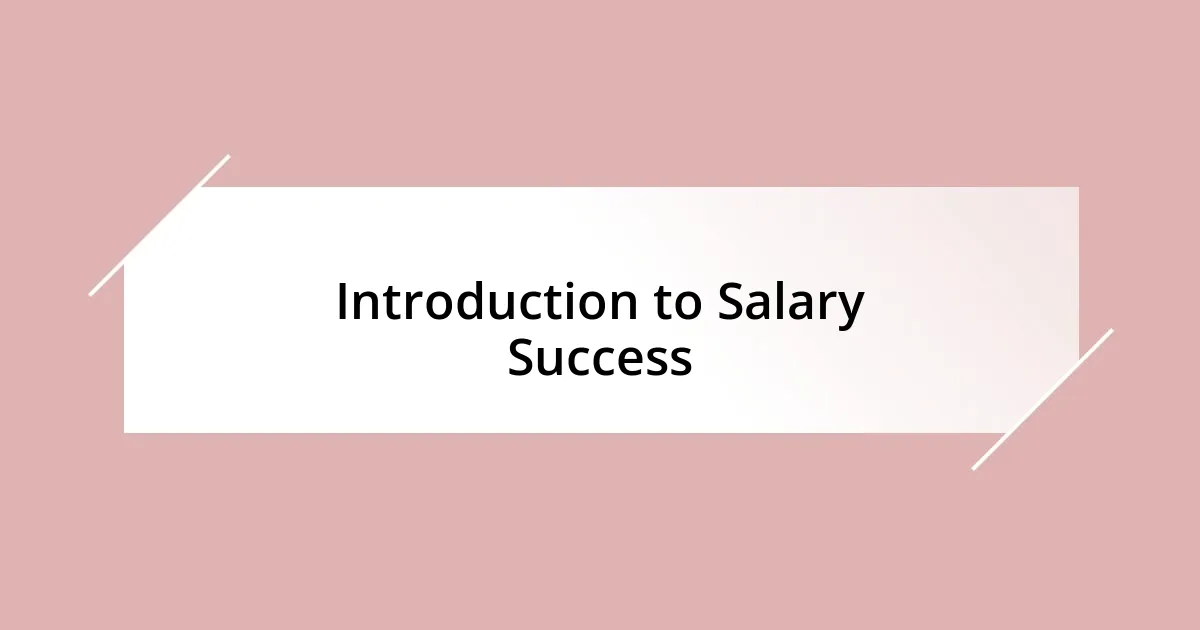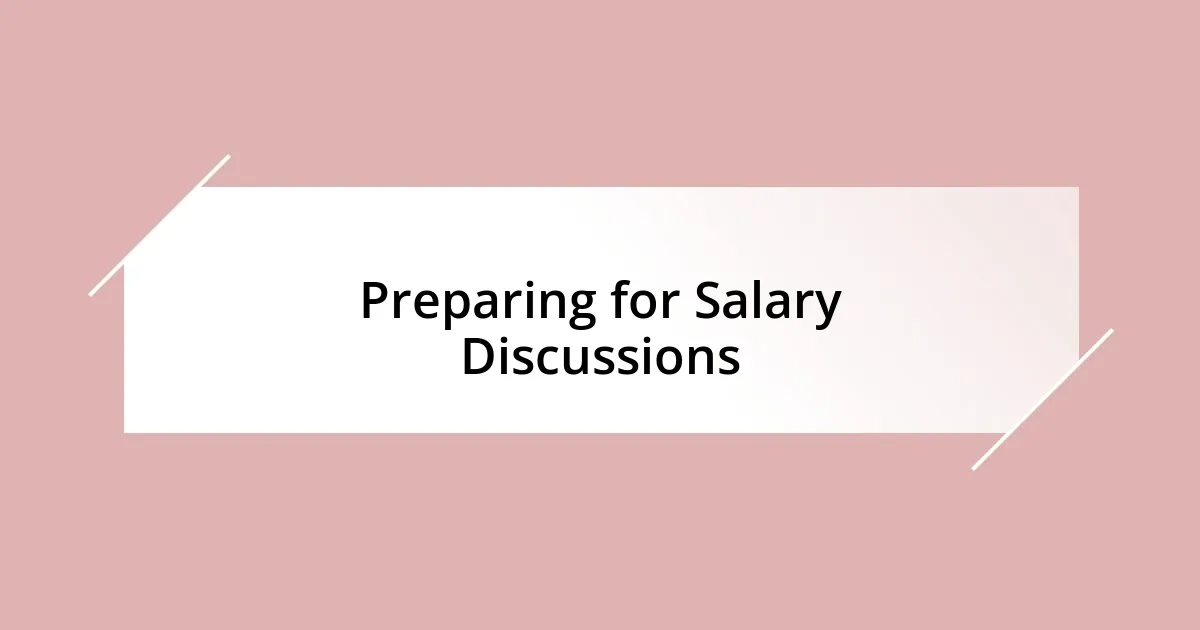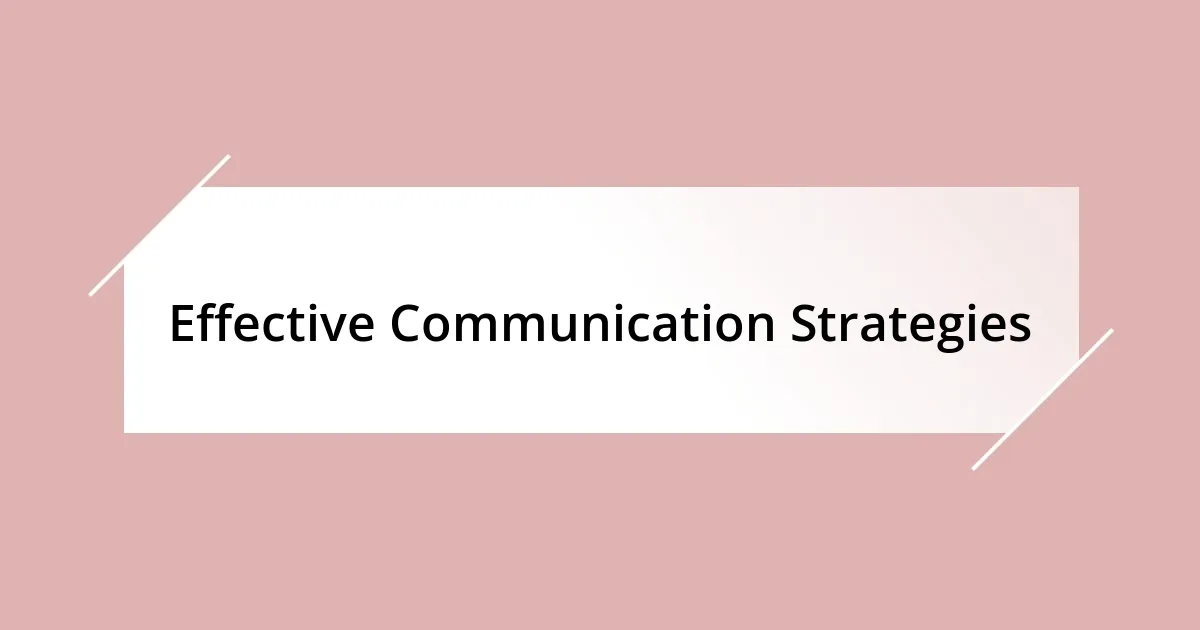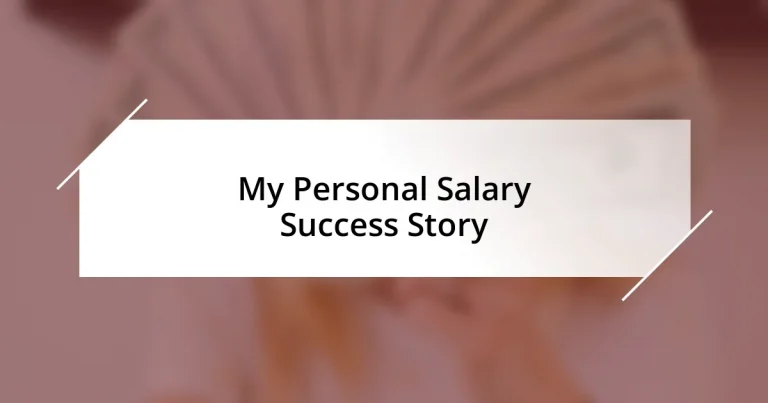Key takeaways:
- Self-advocacy is essential for understanding and communicating your worth in salary negotiations.
- Preparation, including researching market rates and practicing communication, is key to successful salary discussions.
- Overcoming challenges in salary discussions often involves knowledge of industry standards and the confidence to negotiate assertively.
- Celebrating salary achievements reinforces confidence and acknowledges the journey taken to achieve professional milestones.

Introduction to Salary Success
When I think about salary success, I can’t help but reflect on my own journey. It wasn’t a straight path; rather, it felt like a maze of experiences and lessons. Have you ever found yourself questioning your worth in the professional landscape? I certainly have, and navigating that uncertainty opened my eyes to what true salary success really means.
I remember a time when I received a pay raise after a tough negotiation. The adrenaline rush was exhilarating, but it also made me realize how little I once understood about my value in the workplace. I think many people underestimate the power of advocating for oneself. What if I had let fear hold me back? That moment taught me a valuable lesson about self-advocacy and confidence.
At the heart of salary success lies a blend of strategy, timing, and self-awareness. It’s not just about the numbers; it’s about understanding your worth and how to communicate it effectively. So, are you ready to explore what salary success could look like for you? Let’s dive in and uncover the layers together.

Understanding Salary Negotiation
Understanding salary negotiation can feel daunting, but I’ve come to realize that knowledge is power. I recall the first time I stepped into a negotiation meeting, my heart raced. I didn’t know what to expect or how to advocate for myself effectively. That moment taught me that preparation is key. Being well-informed about industry standards allows you to articulate your worth confidently.
To set yourself up for successful salary negotiations, keep these critical strategies in mind:
- Research market rates: Understand the average salary for your position and experience level in your industry.
- Know your value: List your achievements and the contributions you’ve made to your company.
- Practice your pitch: Rehearse what you plan to say to feel more confident during the actual conversation.
- Be open to feedback: Understand that negotiations are often a dialogue, and being receptive can lead to better outcomes.
With these tools, you can step into your negotiation feeling empowered and ready to express your worth.

Identifying Your Market Value
Identifying your market value is a crucial step in your salary journey. I remember when I first started researching my industry’s salary benchmarks. It was eye-opening to discover the gaps between what I was earning and what others in similar roles were making. That realization pushed me to dig deeper into my unique skills and experiences, aligning them with the value I brought to my organization.
As I continued my exploration, I utilized various tools and resources to benchmark my worth. Salary calculators, industry reports, and even networking conversations helped me understand my position in the job market better. It felt like piecing together a puzzle where each piece revealed a clearer picture of my professional standing. Have you ever taken the time to assess your market value? I highly encourage you to do so; it can be a game-changer.
One key aspect I found helpful was comparing my skills against others; it reinforced my understanding of my unique selling points. Keeping a list of my accomplishments and how they contributed to my team’s success helped articulate my worth during negotiations. It’s not just about the salary; it’s about comprehensively understanding what you bring to the table and how to leverage that knowledge effectively.
| Resource | Purpose |
|---|---|
| Salary Calculator | Estimates average pay for your role based on location and experience |
| Industry Reports | Provides comprehensive data on salary trends within specific sectors |
| Networking Conversations | Gains insights from others in your field on market rates and job responsibilities |

Preparing for Salary Discussions
Preparing for salary discussions requires an intentional mindset, and I’ve learned this from experience. I remember feeling apprehensive before my first discussion, but I realized that organizing my thoughts helped calm my nerves. I sat down and made a detailed list of my contributions and skills, and comparing that to industry standards gave me a sense of assurance. Have you ever taken time to reflect on your accomplishments? It can reveal just how much you truly deserve.
Another vital aspect of preparation is understanding the negotiation process itself. There was a time when I entered the room without a clear strategy, and it felt like I was juggling too many balls at once. That taught me the importance of defining my objectives beforehand. Drawing up a few key points I wanted to address allowed me to focus and remain assertive during discussions. What do you imagine your ideal outcome would look like? Visualizing this can keep you motivated and aligned during negotiations.
Lastly, I can’t stress enough the value of practicing with a trusted friend or mentor. Just a few weeks before a pivotal negotiation, I ran through my pitch with a colleague who had successfully negotiated their salary multiple times. Their feedback was invaluable, and I found that I entered the actual discussion much more composed. Having that safe space to make mistakes and refine my delivery turned out to be a game-changer. Have you considered asking someone for a practice run? It can really build your confidence.

Effective Communication Strategies
Effective communication is like the foundation of any successful negotiation, and I’ve learned that clarity is key. I remember a time when I went into a discussion and got lost in jargon, thinking it would impress the hiring manager. Instead, I saw their eyes glaze over. That experience ingrained in me the importance of being straightforward. Do you ever feel tempted to impress with complex terminology? I urge you to keep it simple and focus on delivering your message clearly.
Additionally, active listening plays a pivotal role. During one negotiation, instead of thinking about my next point while the other party was speaking, I fully absorbed their words. It not only opened up a dialogue but also helped me tailor my responses based on their concerns. Have you noticed how much more powerful a conversation becomes when both parties are engaged? This practice turned around the negotiation for me—showing that listening can enhance your bargaining power.
Finally, non-verbal communication can make a substantial impact. I recall a moment when I was nervous about a salary conversation and fidgeted with my pen, which distracted from my message. Once I became aware of my body language, I made a conscious effort to sit up straight and maintain eye contact. It transformed the interaction. Have you considered how your posture might influence the way others perceive you? Little changes in your demeanor can boost confidence and convey professionalism, making a big difference in how your communication is received.

Overcoming Common Salary Challenges
When I faced salary challenges early in my career, I often found myself second-guessing my worth. There was a point when I discovered that the hesitation stemmed from a lack of knowledge about industry standards. Once I dedicated time to research average salaries in my field, I felt empowered to advocate for myself. Have you ever felt unsure about what to ask for? Understanding your market value can transform not only your conversations but also your confidence.
In another instance, I navigated a tricky conversation when my initial salary offer didn’t reflect my experience. Instead of feeling defeated, I took the opportunity to express my appreciation for the offer while articulating why I believed a higher salary was justified. It was nerve-wracking to step away from a potential job, but I had learned the importance of maintaining my boundaries and ensuring that my skills were recognized. Have you ever considered how much power lies in respectfully negotiating for what you believe you deserve?
Finally, I learned that patience can be just as vital as assertiveness in salary discussions. There was a time when I rushed my decision, fearing that waiting might diminish my chances. However, taking a step back allowed me to evaluate the entire offer holistically, including benefits and growth opportunities. It taught me that sometimes, the best outcomes arise when we give ourselves time to ponder. How might slowing down your decision-making process impact your overall satisfaction with a negotiation?

Celebrating Your Salary Achievements
Celebrating your salary achievements doesn’t just mean acknowledging the number on your paycheck; it’s about recognizing the journey that got you there. I still remember the excitement I felt after landing a raise that I had worked so hard for. It was a tangible validation of my efforts, reminding me that every late night and extra project had been worth it. Have you felt a similar rush of elation when you achieved a goal?
Reflecting on the milestones along the way can enhance the joy of celebrating your success. I like to think back to those moments—like when I received positive feedback during performance reviews or when I confidently presented my accomplishments in a team meeting. Each of those instances served as stepping stones that built not only my skills but also my confidence. What achievements, big or small, can you look back on to remind yourself just how far you’ve come?
Finally, sharing your success story can amplify the joy of your achievement. When I told friends and colleagues about my salary jump, their enthusiasm and support made it feel all the more significant. It transformed a personal milestone into a shared celebration, reinforcing a collective sense of accomplishment. How do you share your victories, and how does it feel to involve others in your journey? This sense of community can make the celebration even sweeter.














